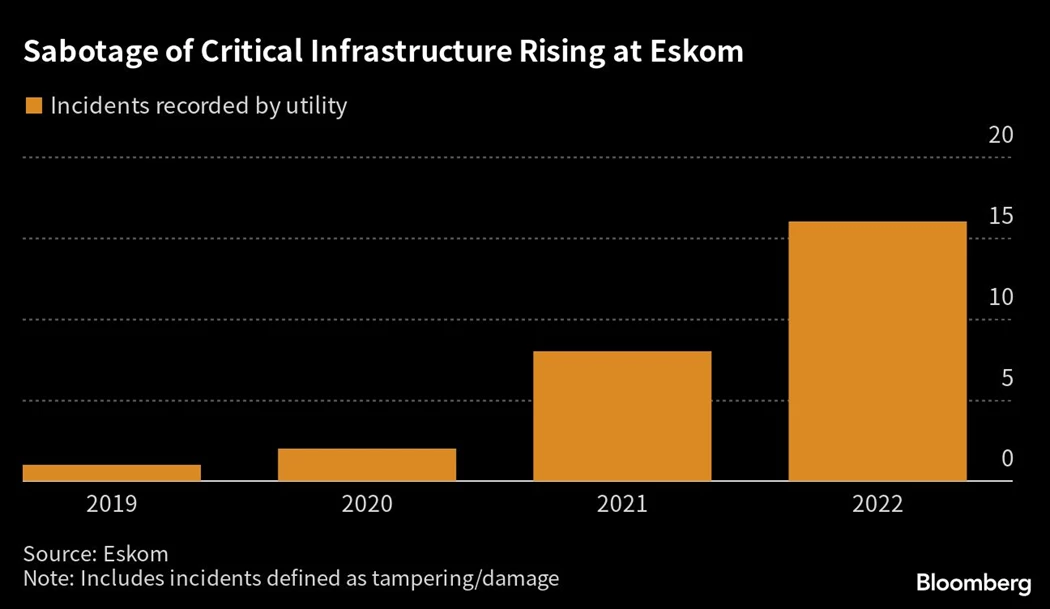Eskom Warns South Africa Faces Record Power Cuts This Winter
(Bloomberg) -- South Africa is at risk of record power outages this winter because the state electricity company may not have enough supply to meet increased demand and efforts to increase generation face delays.
The country faces a “difficult winter” as it heads into the cold months with 3,000 megawatts less capacity than last year, Eskom Holdings SOC Ltd. acting Chief Executive Officer Calib Cassim told reporters on Thursday. The utility envisages a worst-case scenario of having to cut 8,000 megawatts from the electricity grid — a process known locally as loadshedding — which would entail 16 hours of outages in a 32-hour cycle.
The continent’s most industrialized economy is already experiencing its worst bout of power rationing yet, with outages this year exceeding those for all of 2022, because Eskom can’t meet demand from its old and poorly maintained plants. The central bank estimates that the outages will shave 2 percentage points off South Africa’s economic growth rate this year.
The blackouts and the deteriorating economic outlook have weighed on investor sentiment, with the rand dropping 12% this year — the worst performance among major currencies monitored by Bloomberg. The decline is also at odds with emerging-market peers, which have largely made strides against the US currency this year.

The rand fell as much as 1.3% to a record low on a closing basis, and traded 1% lower at 19.4409 per dollar by 11:32 a.m. in Johannesburg. The yield on South Africa’s generic 10-year government bond was little changed at 12.1%.
“Things are still looking rather gloomy for South Africa, with news headlines being centered around intensifying load-shedding,” analysts at Rand Merchant Bank said in a client note.
South Africa has taken numerous measures to stabilize the power supply but none have had a significant impact. The implementation of plans announced by President Cyril Ramaphosa to expand the procurement of renewable energy has been hobbled by a lack of grid capacity. In March, he appointed Kgosientsho Ramokgopa as electricity minister and tasked him with resolving the crisis, but his powers still haven’t been defined.
The outages have also dented support for the governing African National Congress, with opinion polls showing the party is in danger of losing its parliamentary majority in next year’s elections.
Eskom’s recent efforts to improve its performance have slipped, with maintenance at its Koeberg nuclear facility falling behind schedule and units requiring repairs at Kusile, its newest coal-fired plant. The energy availability factor, a measurement of usable generation capacity, has dropped to 52%, from a target of 60%, Cassim said in the presentation.
The utility began a critical phase of revamping its sole nuclear-power facility in December when it started work on the first of two units. Work on replacing a steam generator at the 1,940-megawatt Koeberg plant, often regarded as the utility’s most reliable facility, has already fallen behind schedule and is now expected to be completed in September. That’s had a knock-on effect on plans to repair its second reactor.
Eskom has meanwhile been rocked by revelations in a book published this month by former Chief Executive Officer Andre de Ruyter, including widespread dysfunctionality at its plants, improper conduct by some of its officials and ongoing political interference in its operations. Mpho Makwana, the company’s chairman, said De Ruyter broke trust by writing the memoir.
Crime and sabotage have posed an additional challenge for Eskom. Incidents are reported for investigation, the utility’s head of generation, Bheki Nxumalo, told reporters. “We need to concentrate on running the plant,” he said.

While Eskom apologized to South Africans for the power cuts, it ultimately called on the public to help reduce demand.
“The biggest impact we can all make as a nation is to use electricity sparingly, especially during the peaks,” it said.
(Updates throughout with information from presentation and background)
©2023 Bloomberg L.P.





